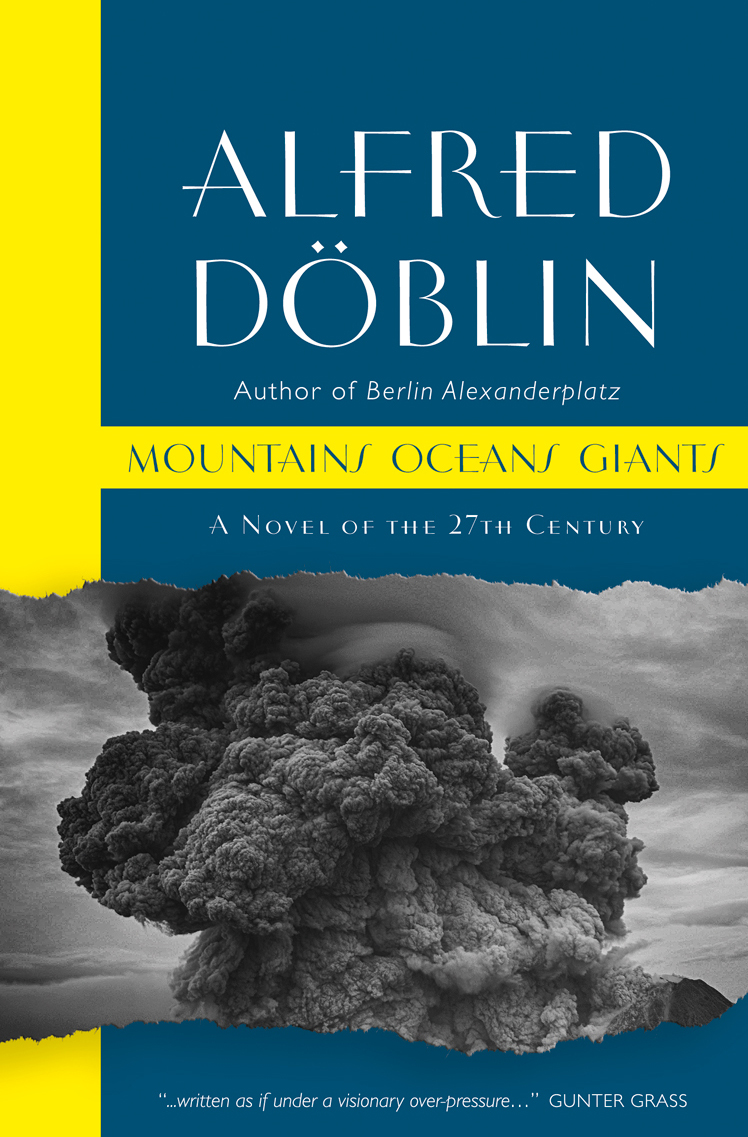
I know of no attempt in literature that pulls together so boldly and directly the human and the divine, piling on every kind of action, thought, desire, love… Here perhaps the true face of “Expressionism” reveals itself for the first time. – Max Krell
The 27th century: beleaguered elites decide to melt the Greenland icecap. Why? – to open up a new continent, for colonisation by the unruly masses. How? – by harvesting the primordial heat of the Earth from Iceland’s volcanoes. Nature fights back, and it all goes horribly wrong…
In the early 1920s confirmed city-dweller Alfred Döblin – he was 15 before he saw his first cherry tree – became puzzled by a nagging sense of Nature:
“I experienced Nature as a secret. Physics as the surface, begging for explanations. Textbooks… knew nothing of the secret. Every day I experienced Nature as the World Being, meaning: weight, colour, light, dark, its countless materials, as a cornucopia of processes that quietly mingle and criss-cross.”
Readers accustomed to following a story via Plot and Character may at first be disoriented by this epic of the future. Its structure is more symphonic than novelistic, driven by themes and motifs that emerge, fade back, emerge again in new orchestral voicings and new tempi. The prose – supple, rhythmic, harsh, elegiac, tender, unsparing – propels the reader on through scene after vivid scene. Mountains Oceans Giants is a literary counterpart to the painted dreams and nightmares of Hieronymus Bosch, in The Garden of Earthly Delights and The Last Judgement.
Alfred Döblin, born in Szczecin in 1878, initially worked as a medical assistant and opened his own practice in Berlin in 1911. Döblin’s first novel appeared in 1915/16. His greatest success was the novel Berlin Alexanderplatz published in 1929. In 1933 Döblin emigrated to France and finally to the USA. After the end of the 2nd World War he moved back to Germany, but then moved in 1953 with his family to Paris. He died on June 26, 1957.
Berlin Alexanderplatz (translated by Michael Hofman) is published by Penguin in the UK and New York Review Books in the USA.
VIDEO BOOK REVIEW OF MOUNTAINS OCEANS GIANTS
https://www.youtube.com/watch?v=8GouTs49jlk (Video posted early 2022).
Review in the Los Angeles Review of Books by Alexander Langstaff, 9th July 2021:
MOUNTAINS OCEANS GIANTS is perhaps the most forgotten modernist epic of the Anthropocene ….[ … ] Rediscovering this strange book means rediscovering how, over a century ago, one of Germany’s greatest writers thought and wrote about climate science. Originally published in 1924 as Berge Meere und Giganten, it has now been translated into English by Chris Godwin.
Alfred Döblin (1878–1957) is best known for the novel Berlin Alexanderplatz, which the critic Michael Hofmann has described as “that tombstone overlaying, nay, burying, crushing, obliterating the possibility of any interest in his other work.” With his translation of Mountains Oceans Giants, Godwin demolishes this one-novel mausoleum by showcasing Döblin’s breadth.
[ … ] Mountains Oceans Giants represents a pioneering attempt to combine literary fiction with climate science long before there was a market. But the book is also a deeply personal exorcism of his generation’s war traumas. Döblin attempts to make sense of the dynamic relationship between humans and the environment through war. And so the trenches and wastelands, mustard gas clouds and tunnel warfare, of the Western Front feature prominently in his book.
[ … ] To elaborate an entirely new way of seeing nature is hard; doing so in demented, beautiful prose is harder still. One of Döblin’s editors described him as “the Energiser” whose writing “sweeps like a wild flood over cozy descriptive narrative.” [ … ] with Mountains Oceans Giants, Döblin should also be added to a forgotten literary canon of writers who have sought to collapse human and natural histories into a new genre worthy of our changing environment. In peeling back the familiar stratum of the planet to reveal something unfamiliar and unsettling, their futuristic dystopias were really histories of the present.
ISBN: 978-1-912916-24-5 | £12.99
129 x 197 Buy at amazon.co.uk
